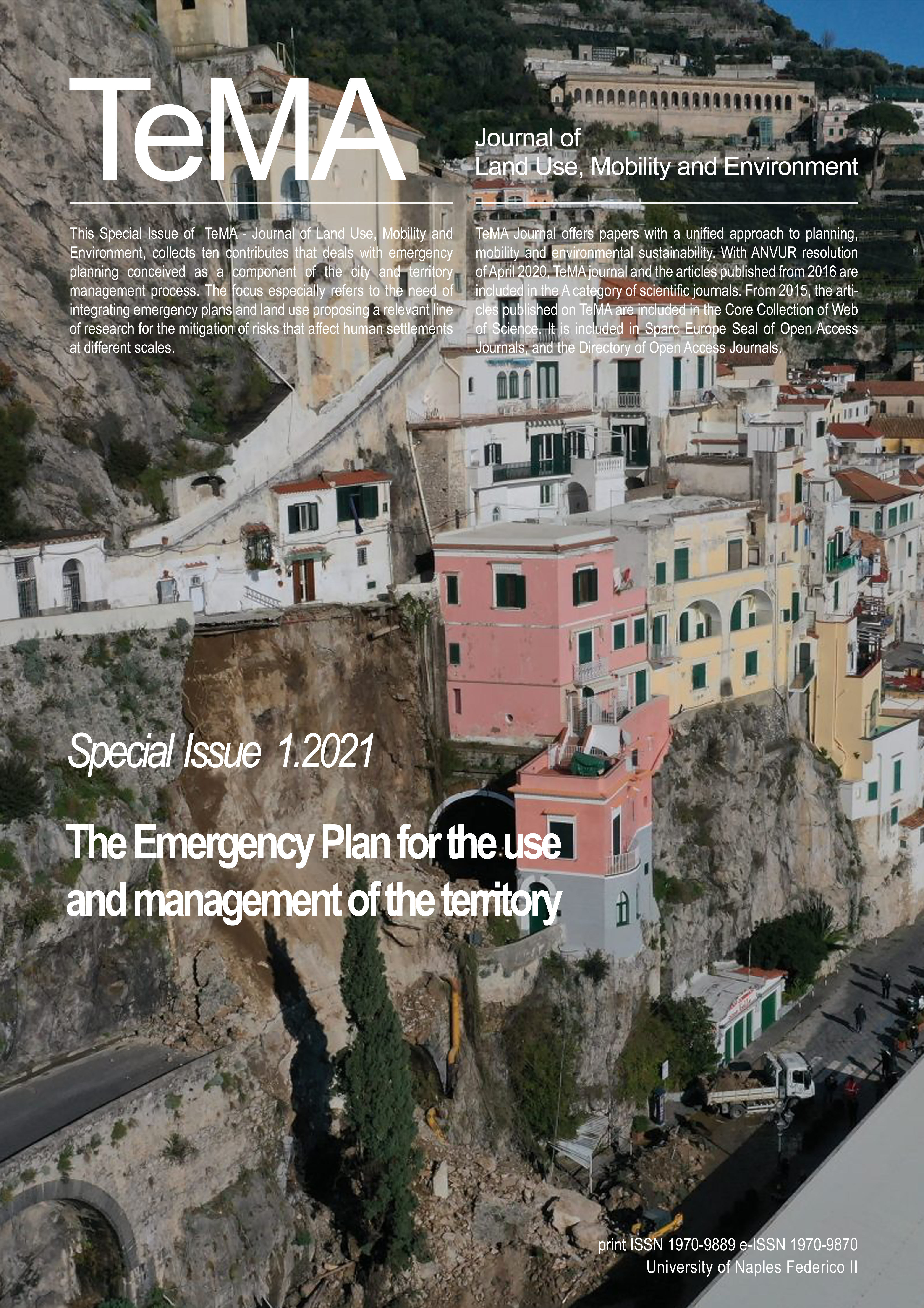The time profile of transformations in territorial governance
Towards a meeting point between urban planning and risk management
Abstract
As a result of the close relationship with the School of Architecture founded in 1919, Italian urban planning has often been marked by a search for a difficult balance between spatial and temporal projections in plans, often favouring the former over the latter. Due to this unequal development in planning contents, territorial governance has shown a worrying loss of authority, which tends to generate evident contradictions when territorial planning is called to contend with problems deriving from the management of areas where urban planning forecasts must coexist with extraordinary provisions adopted following an earthquake or other natural disaster. In this recurring difficulty of finding space within ordinary planning procedures for measures designed to address the emergency, three starting conditions prove to be decisive. The first is the need to guarantee the availability of a rigorous cognitive framework to allow an increasingly complex planning system to be based on rich, detailed information. The second is the requirement to reduce the gap between the technical times necessary to develop planning tools and the necessary promptness for procedures to coordinate emergency policies. The third is the need to entrust strategic documents with the task of balancing the relationship between the short and long terms, both in urban planning and in emergency plans.
Downloads
References
Agenzia per la coesione territoriale (2018). Rapporto sui tempi di attuazione delle opere pubbliche. Temi CPT, n. 6.
Annesi, N., Rizzo, A. & Scamporrino, M. (2017). Transition management come strumento preventivo di una visione condivisa di aree esposte a calamità naturali. In: M. Talia (Ed.). Un futuro affidabile per la città, Roma-Milano: Planum, pp. 298-307.
Aven, T. & Zio, E. (2018). Knowledge in Risk Assessment and Management. New York: Wiley.
Barca, M. & Bruzzo, A. (2019). Politica di coesione 2014-2020 e capacità di spesa delle Amministrazioni Italiane al 2018. EyesReg, 9 (2).
Barca, F. & Ricci, F. (2018). Conversando con Fabrizio Barca. Viaggio nell’Italia diseguale. Roma: Ediesse.
Bauman, Z. & Mauro, E. (2015). Babel. Bari: Laterza.
Carlucci, C., Giorgiantonio, C. & Orlando, T. (2019). Tempi di realizzazione delle opere pubbliche e loro determinanti. Questioni di economia e finanza (Occasional Papers). Rome: Banca d’Italia.
Cerase, A. (2017). Rischio e comunicazione, Milano: Egea.
Governa, F. (2014). Tra geografia e politiche. Ripensare lo sviluppo locale. Roma: Donzelli.
Harvey, D. (2011). L’enigma del capitale. Milano: Feltrinelli.
Hirschman, A.O. (2003). Felicità privata e felicità pubblica. Bologna: Il Mulino.
Mason, P. (2016). Postcapitalismo. Milano: Il Saggiatore.
Mazzucato, M. (2020). Non sprechiamo questa crisi. Bari-Roma: Edizioni Laterza.
Rotmans J., Kemp R. & Van Asselt M. (2001). More evolution than revolution: transition management in public policy. Foresight, 3 (1).
Talia, M. (2017a). A quiet revolution is coming. Urbanistica, LVII (157), p. 8-13.
Talia, M. (2017b). Muoversi con sapienza nei territori dell'incertezza. In M. Talia (Ed.), Un futuro affidabile per la città. Apertura al cambiamento e rischio accettabile nel governo del territorio, Roma-Milano: Planum, pp. 9-18.
Talia, M. (2018). Knowledge as a strategic asset in relaunching urban planning. Urbanistica, LXIX (160), p. 60-64.
Talia, M. (2020). La logica dell’emergenza nelle politiche urbane e negli strumenti di pianificazione” In Francini, M., Palermo A. & Viapiana M.F. (Eds), Il piano di emergenza nell’uso e nella gestione del territorio, FrancoAngeli, Milano, 2020, pp. 136-146.
Veronese, A. (2020). Urbanistica forense al tempo del postcovid-19”. Padova: Associazione Avvocati Amministrativisti del Veneto. Retrieved from: http://www.amministrativistiveneti.it/urbanistica-forense-al-tempo-del-post-covid-19/
Wolff, J. (1991). Robert Nozick: Property, Justice, and the Minimal State. Cambridge: Polity Press.
Authors who publish in this journal agree to the following:
1. Authors retain the rights to their work and give in to the journal the right of first publication of the work simultaneously licensed under a Creative Commons License - Attribution that allows others to share the work indicating the authorship and the initial publication in this journal.
2. Authors can adhere to other agreements of non-exclusive license for the distribution of the published version of the work (ex. To deposit it in an institutional repository or to publish it in a monography), provided to indicate that the document was first published in this journal.
3. Authors can distribute their work online (ex. In institutional repositories or in their website) prior to and during the submission process, as it can lead to productive exchanges and it can increase the quotations of the published work (See The Effect of Open Access)

